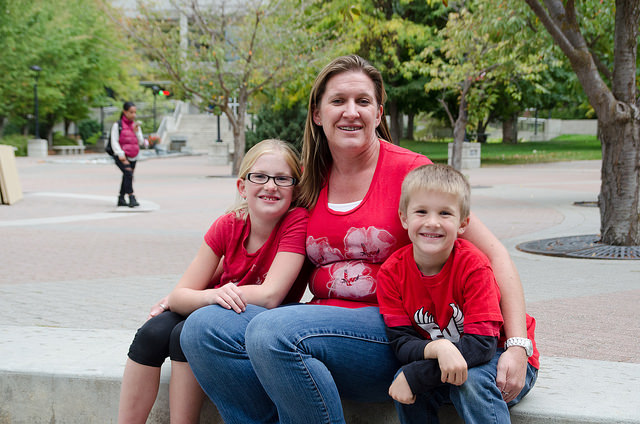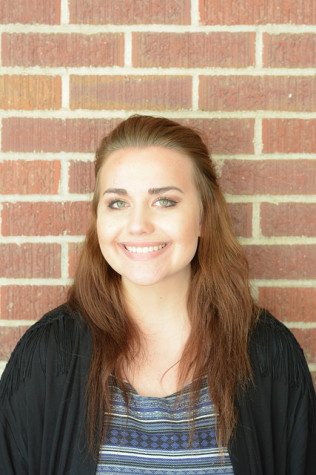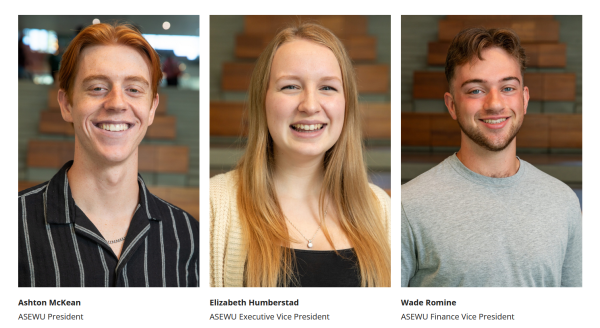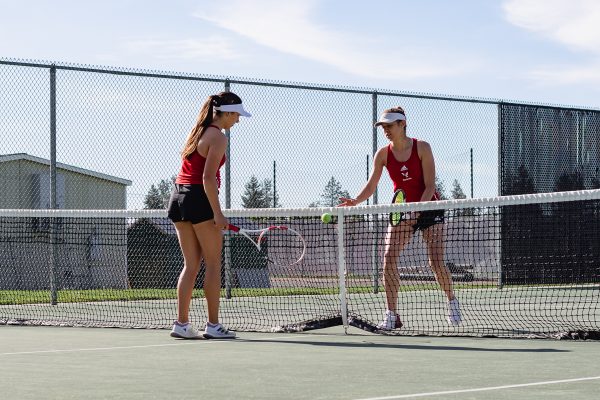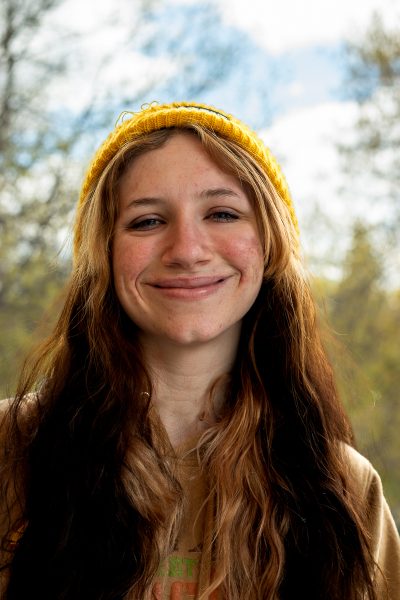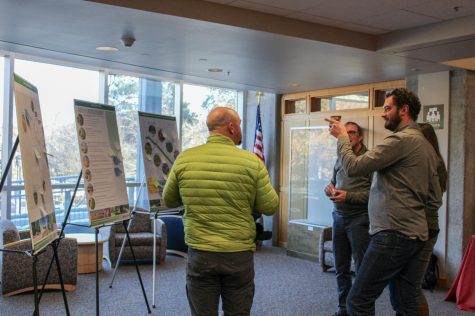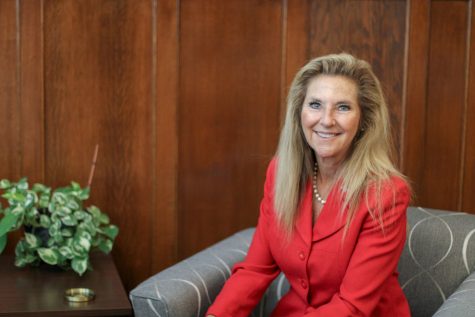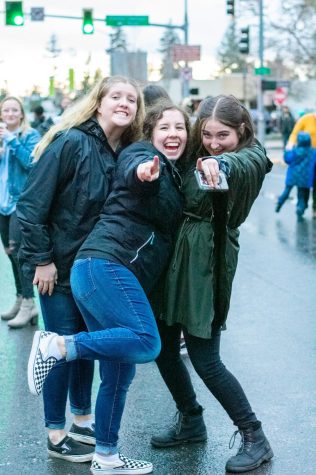Finding a Balance: A student perspective
EWU student Teresa Messenger and her two children.
There is one episode of “The Fresh Prince of Bel Air” when Will pretends to be a single dad attending university. The single dad role allows him to be an eligible bachelor. Suddenly, all the girls are cooing at his baby and he is getting their numbers. Then he receives presents and admiration for his “commitment to fatherhood.” Will is drawn to this lie because of the romanticised appeal.
In the episode, the difficulties of parenthood are lightly mentioned, but mostly casually dismissed, and the rewards clearly exaggerated. But where the episode fails in accurately portraying parenthood, it succeeds in affirming one thing: parenthood is indeed both rewarding and difficult.
When someone is a student in addition to being a parent, juggling stops being an act and becomes a survival skill. Student-parents are juggling every aspect of their lives doing their best to maintain an equilibrium for themselves, their families and their futures.
Linda Loomis, director of the Children’s Center at EWU, recalls a time when she herself was a student at Eastern about twenty years ago. One day a mother brought her baby to class because she had nowhere else to take the child.
“She missed one day due to her pregnancy. She had the baby on a Thursday, missed class on Friday and came in on Monday with this little bitty newborn,” Loomis said. “She had already talked to the professor about, ‘If it’s not a distraction could I have the child there?’ and he said, ‘Oh, we’ll see how that goes.’ And during the class the baby started to whimper and he just walked over and scooped her up out of her little seat, put her on his shoulder, patted her back and walked around continuing to give his lecture. It was very cool.”
Today parents with newborn children still struggle to find adequate childcare. However, there are other various resources available on campus.
Teresa Messenger, student and mother, appreciates the Helping Ourselves Means Education program available on campus. The HOME program offers scholarships for child care expenses, free pizza and reading nights and a Christmas program that includes The Giving Tree. The Giving Tree provides gifts for children of student-parents. According to the EWU website, HOME defines itself as a networking program for low-income and non-traditional student-parents and maintains a resource referral database.
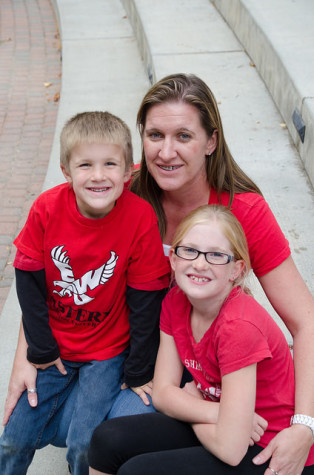
EWU student Teresa Messenger and her two children.
Messenger, a mother to two, Kailey, now nine and Blahne, now six, became a student at EWU two years ago after a divorce. She came from a family of educators and realized she too felt called to be a teacher. So she enrolled in EWU, while enrolling Blahne into the Early Childhood Education & Assistance program for low-income families.
“I took that opportunity to start fresh and try something new,” Messenger said. “There’s other people who have done it, why can’t I?”
ECEAP offers education, nutritious meals, health screenings, free preschool services and family support services.
However, ECEAP has limited availability.
According to Linda Loomis, director of the Children’s Center at EWU, there is room for only 24 preschool students in ECEAP. Among those who are eligible are families living on a limited income based on federal poverty guidelines, children in foster care, families who are homeless and children with diagnosed disabilities.
The children’s center in EWU and Noah’s Ark are the only two authorized daycares in Cheney at the moment. This means limited room for children. There is a discount for parents with more than one child.
The Services and Activities committee at EWU also provides a discount for the child care center solely for student-parents.
There are families where the tasks and schedule can be divided between both parents while one or both of them is at school. Such is the case with Courtney Sollars, a first-year dental hygiene student, mother of three, and manager of the Townhouses at EWU, Eastern’s family housing.
Seven weeks after her youngest was born, Sollars received a startling diagnosis: cancer. It was then she realized she did not want to waste another day going to a job that she wasn’t passionate about.
Upon returning to school, Sollars enrolled her youngest in the Children’s Center as well as ECEAP. Currently, Sollars’ children are ages 16, 11 and four. Her husband helps her balance family life and school. This is also the third year Sollars has been cancer free.
“I am incredibly organized and I have a wonderful support system at home. My husband is amazing and plays Mr. Mom during the week and my kids are pretty darn super about checking their chore charts for what needs to be taken care of,” Sollars said. “I am also not afraid to ask for help and I feel like the luckiest girl in the world to have such great families in our complex who step up to help when needed.”
When it comes to single parenting, the dynamic is a bit different.
As a single parent, Messenger’s best study time is arranged after her two children are put to bed. She attends classes during the day, picks her children up from school and then takes care of them.
“I’m basically mom and dad for everything,” Messenger said.
Luckily, Messenger is part of a community of mothers who support each other.
There are two Facebook groups within the Cheney area made for mothers looking for community: Cheney Mom’s and EWU Mom’s Who Bond.
Messenger says that the support she receives and gives comes in all shapes. Help ranges from one mother picking up another’s children to babysitting them when a schedule conflict arises.
In regards to resources on campus, Messenger is appreciative of what exists but wishes more could be done, such as getting the word out better about what is available for parents who struggle.
“A lot of resources I had to dig for because I couldn’t find selective resources,” Messenger said.
Even though Messenger would not claim this, it seems she is becoming the voice for many mothers in Cheney and at EWU. She discovers and shares many resources with other moms, coordinates events and encourages community involvement.
Messenger hopes that her children will come to value education through her example.
“Living here has given them an opportunity to see me as their role model,” Messenger said.
Both Sollars and Messenger say the support they have received from professors has been helpful. Most are understanding of their situation and ready to accommodate.
“I have been very lucky in both of my degree programs in terms of support from instructors. I was even thrown a baby shower in one of my classes when I attended EWU for my first bachelor’s degree,” Sollars said. “I was given extra time to complete projects at the end of a quarter when my son was born. I have never had a professor who wasn’t willing to have a conversation about the things that were going on in my life if I was in need of support. This has been key in my success here.”
The tricky part for Sollars about pursuing her education and devoting time for her family is that there is never enough time in the day.
Sollars travels to the Riverpoint campus in Spokane everyday using the public transit system, which is convenient but time consuming.
When she’s not in classes, she is also taking care of her duties as the manager of the townhouses.
Michelle Schultz, apartment coordinator at EWU, states that the university apartments have 107 units reserved for students who are married with or without children, and single graduate students.
According to Schultz, single graduate students can live in the Anna Maria and Holter House apartments, and family students can live in all three including the Townhouses.
“The university apartments currently house three visiting scholars (and their families), 13 single graduate students and at least 79 family students,” Schultz said in an email interview. “It is difficult to pin down exactly how many students we serve because only one student acts as the primary tenant and if the student’s spouse is taking classes as well, they still only count as one tenant.”
Schultz said that they do have graduate students with families, but with the way their system works, students with spouses with or without children are considered family students and not graduate students in terms of eligibility.
Although tangible support and services are crucial for students with children, some parents may be lacking emotional support.
For those who find themselves in need of emotional support, EWU has Counseling and Psychological Services (CAPS) available in Martin Hall 225. It offers a Family Matters workshop which was specifically developed to help student-parents.
CAPS also has a Family Matters group which is open to parents who want to understand their own family history and how it impacts the way they raise their children. It typically runs for about five to six weeks each quarter.
The Family Matters workshop and group are open to non-parents as well. The office also helps with numerous referrals, including counseling for children, access to food, furniture and other necessities.
Melinda Ovnicek, counselor at EWU, stresses the importance of being part of a support circle, because it provides a relatability with those in a similar situation and normalizes their experience.
According to Ovnicek, counseling can be vital for a parent who lacks connection to a strong support circle.
“As a counselor I believe strongly in the benefits of counseling and I also believe in reducing the stigma around counseling. You can come to counseling just because you want to increase your understanding,” Ovnicek said. “This is a resource many people won’t be able to utilize once they leave college. I strongly encourage folks to come and dabble in it.”
For parents who want to return to school, but feel apprehensive and intimidated, Sollars is all encouragement.
“You can do it; there are people and resources here on campus that are here to help,” Sollars said. “Don’t sit on your dreams, reach for them.”




